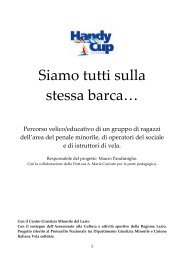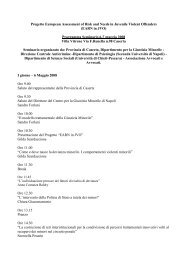Scarica il documento - Dipartimento per la Giustizia Minorile
Scarica il documento - Dipartimento per la Giustizia Minorile
Scarica il documento - Dipartimento per la Giustizia Minorile
You also want an ePaper? Increase the reach of your titles
YUMPU automatically turns print PDFs into web optimized ePapers that Google loves.
allegati<br />
este<strong>la</strong> Welldon, in a recent pa<strong>per</strong> on <strong>per</strong>version as a manic defence, considers it as<br />
an attempt of the individual to protect himself from a profound depression. others, like<br />
limentani, regard <strong>per</strong>version as a defence against psychosis.<br />
The Treatment of Ch<strong>il</strong>dren and Adolescents at the Portman<br />
even though the portman only accepts patients who are violent, delinquent or who<br />
manifest sexual disturbances, an absolute or simple rigid distinction is not made between<br />
the victim and the <strong>per</strong>petrator when thinking of the individual and his <strong>per</strong>sonal history,<br />
which presents a particu<strong>la</strong>r challenge. For example, in the case of sexual abuse: the majority<br />
of young abusers have themselves been victims of some kind of trauma or abuse. 50% of<br />
them, according to one study, have been sexually abused. the other 50% have <strong>per</strong>haps<br />
been victims of other types of trauma, such as witnessing or being part of domestic violence,<br />
which a very commonly found element in the fam<strong>il</strong>y history of abusers.<br />
on the other hand, who w<strong>il</strong>l become an abuser cannot be predicted: only 5% of<br />
ch<strong>il</strong>dren known to have been abused become abusers themselves. there are not as yet<br />
enough studies to give a more precise idea as to what might predispose young people to<br />
adopt sexually abusive behaviour.<br />
in the case of violent and delinquent adolescents, it is well-known that most of them<br />
have suffered physical and emotional maltreatment in their early life.<br />
it is difficult to evaluate the treatab<strong>il</strong>ity of young abusers, and impossible to ensure<br />
success in therapy, as we cannot predict which of them w<strong>il</strong>l grow into adults who <strong>per</strong>sist<br />
with <strong>per</strong>verse practices.<br />
Thoughts about the Future<br />
in the 75 years of the existence of the portman Clinic, a great deal of very deta<strong>il</strong>ed<br />
knowledge has been accumu<strong>la</strong>ted regarding the pathology and treatment of ch<strong>il</strong>dren and<br />
adolescents who are delinquent, violent, or who act out sexually. the work at the portman<br />
has had a positive influence on the attitudes of the authorities; there have been changes<br />
towards more therapeutic rather than punitive models.<br />
Nevertheless, we face serious problems in the management and treatment of<br />
these young people. Cognitive therapies have become very popu<strong>la</strong>r at present in the<br />
uK. they are attractive to public health bodies because of the re<strong>la</strong>tively low cost, low<br />
duration and apparently quick recovery of the individuals treated – despite the known<br />
fact that the improvements may only be temporary, and the reality that this type of<br />
therapy does not touch the most basic underlying psychic structures that determine the<br />
offending behaviour. For the young people in question, the risk of not obtaining anything<br />
more than the most su<strong>per</strong>ficial improvement is that the psychic structures that form a<br />
“<strong>per</strong>verse adaptation” w<strong>il</strong>l become established in a more definite form and result in a<br />
more <strong>per</strong>manent <strong>per</strong>version in adulthood. the authorities, just like the victims of abuse,<br />
are misled by the positive external results, wh<strong>il</strong>e the internal fraudulent scenario continues<br />
to exist. the adolescent simu<strong>la</strong>tes, imitates, and convinces everyone that his attitudes and<br />
behaviour have changed, wh<strong>il</strong>e the fantasies and the impulses that govern his internal<br />
world triumph in deceit.<br />
249





